Des del campus
6. On campus
Ten years unravelling the mysteries of human cognition
A team of 100 people are doing just that at the UPF Center for Brain and Cognition (CBC)
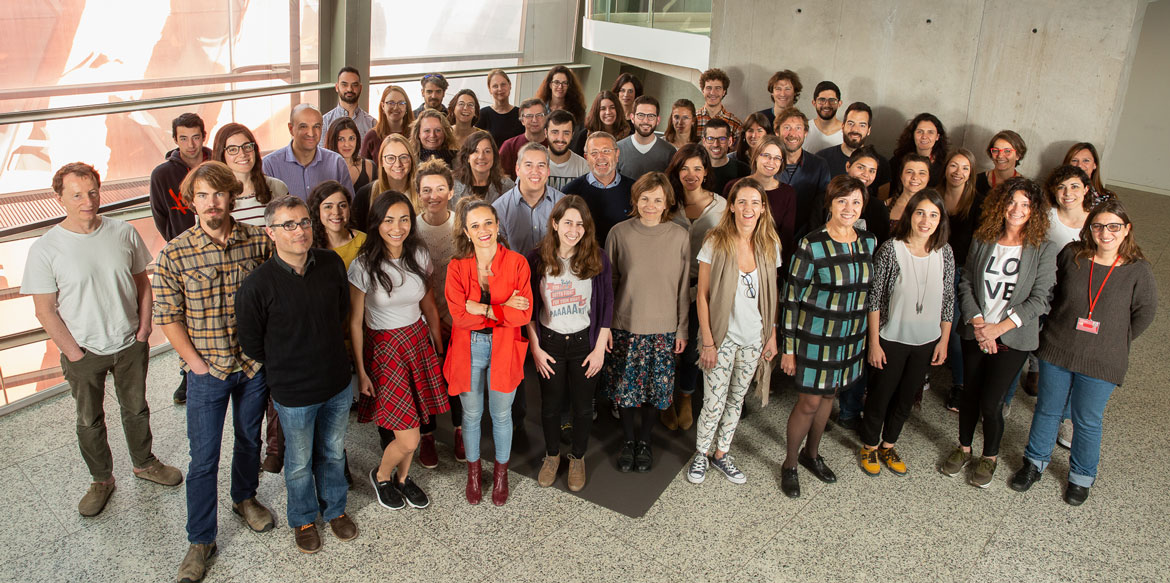
Basic neuroscience has shed light on various aspects of how individual neurons work, the mechanisms that enable neural communication, the processes through which nerve cells develop and adapt, and the processes governing how they function. But how does all this brain activity give rise to human cognition?
That is the fundamental scientific question that the researchers at UPF’s Center for Brain and Cognition (CBC) have been trying to answer since it was founded in 2009. For the last ten years, they have worked to make the CBC an international benchmark, highly influential in the field of the interaction between cognition and the brain in both the hard and soft sciences. They have sought to advance our understanding of how experience influences the emergence of function and structure in the brain through computational and experimental research.
The CBC has its own neuroscience laboratory where the researchers conduct their research. As a result of their research excellence, their projects have been awarded various sources of funding in highly competitive calls.
Projects funded by the European Research Council (ERC) are considered an indicator of excellence in research management. The CBC has been awarded two Starting Grants (Salvador Soto and Juan Manuel Toro), two Advanced Grants (Núria Sebastián and Gustavo Deco), one Proof of Concept (Salvador Soto) and three Coordination and Support Actions (Núria Sebastián for her work as vice-president of the ERC). Although the CBC accounts for just 2% of the UPF’s principal investigators (PIs), it is the recipient of 26% of the ERC projects awarded to the university.
Comunitat CBC - 98 persones

A multidisciplinary approach
The centre comprises seven research groups and is part of the Department of Information and Communication Technologies (DTIC). According to Gustavo Deco, director of the CBC, ‘The winning strategy is to have a multidisciplinary group that strives to answer the fundamental question of how human cognition is possible from different approaches and points of view.’ In all, the CBC is made up of a hundred people, including researchers, teaching staff, research support staff and administrative staff. ‘Constellations like ours are very rare’, said Núria Sebastián, co-founder of the centre.
The centre’s multidisciplinary research has yielded 493 papers published in high-impact journals in 20 different fields and has been cited 13,380 times (until 2008), 10,695 not counting self-citations.
Center for Brain and Cognition research groups
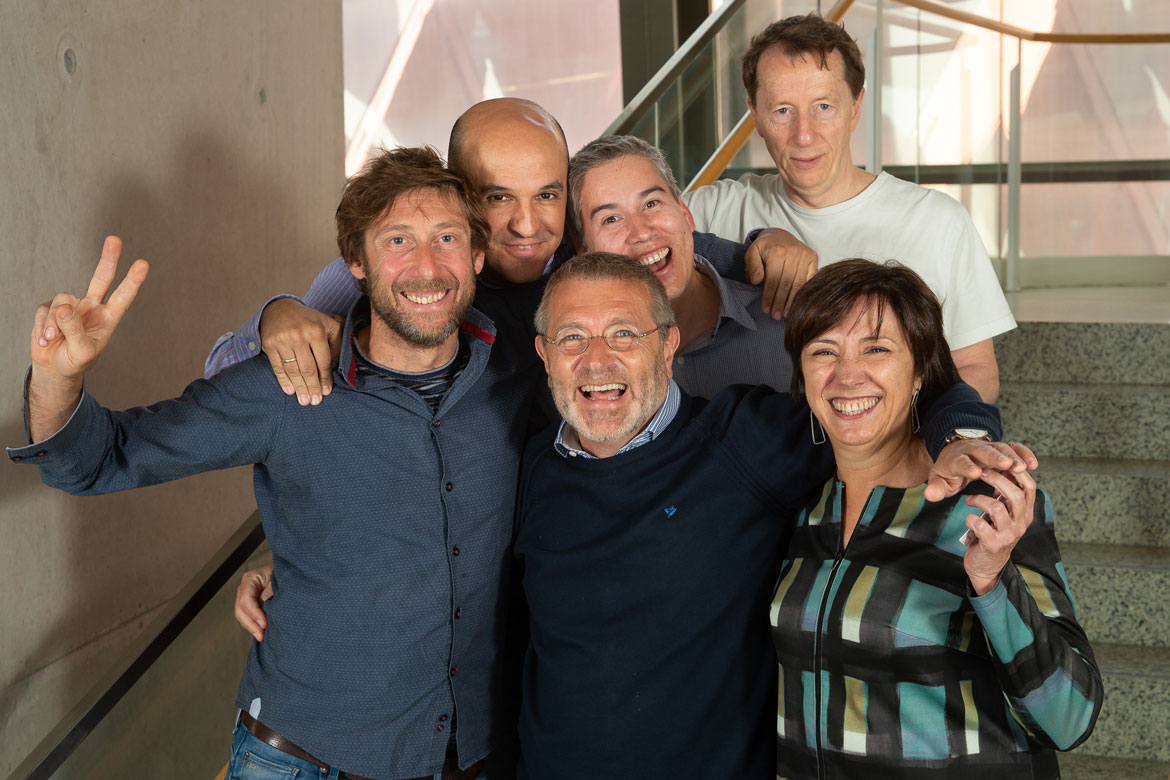
Computational Neuroscience (CNS), led by Gustavo Deco
‘We were amongst the first to study the brain from a holistic point of view’
The Computational Neuroscience (CNS) research group investigates the neuronal and cortical mechanisms of perception and cognition. By developing explicit neurodynamic mathematical models of brain function with regard to neuronal and synaptic activity, the group has developed a theoretical framework to deepen understanding of a wide range of mechanisms and computations underlying higher brain functions. Through the integration of functional magnetic resonance imaging (fMRI) and neuropsychological findings, many aspects of cognitive function can now be modelled and better understood.
‘Brain songs’ show that it takes us 200 milliseconds to process signals in our environment
According to the authors, ‘The new space-time framework, which we have poetically called “brain songs”, provides important data on the networks involved in the transmission of information at this rapid timescale (200 ms) and across the brain as a whole.’ These findings support and expand upon existing knowledge regarding when information becomes consciously available in the human brain.
Gustavo Deco, Josephine Cruzat, and Morten Kringelbach (2019). ‘Brain Songs Framework Used for Discovering the Relevant Timescale of the Human Brain’, 4 February, Nature Communications, 10, No. 583.
https://repositori.upf.edu/handle/10230/36610
Language and Comparative Cognition (LCC), led by Juan Manuel Toro
‘We study language and music from a comparative point of view’
The Language and Comparative Cognition (LCC) research group studies the mechanisms responsible for human language capabilities and whether humans share fundamental processes with other animals. The group also studies the language and perceptual constraints that shape these processes in different stages of human development.
A study establishes the neural bases for musical language processing in humans
‘We have seen that musicians respond more quickly and strongly to changes in consonance and dissonance than people unfamiliar with music.’ This suggests that musical training primes the brain to better detect such changes. ‘Our results show the underlying neural bases for the benefits of processing consonance over dissonance in humans’, the researchers explained.
Paola Crespo-Bojorque, Júlia Monte-Ordoño, and Juan M. Toro (2018). ‘Early Neural Responses Underlie Advantages for Consonance over Dissonance’, Neuropsychologia.
https://doi.org/10.1016/j.neuropsychologia.2018.06.005
Multisensory Research Group (MRG), led by Salvador Soto
‘We are interested in both human behaviour and the brain activations corresponding to that behaviour and to human perceptions’
The Multisensory Research Group (MRG) researchers aim to understand the neural and cognitive bases of human perception and attention processes in multisensory environments. They study multisensory interactions in a wide range of perceptual domains (from speech perception to body representation) using a variety of scientific approaches (from psychophysics to neuroimaging).
Audiovisual incongruities lead to an increase in theta brain waves
The results of the study show that the perception of audiovisual incongruities leads to an increase in brain activity in the electrophysiological band corresponding to theta waves. These results suggest that the resolution of such perceptual conflicts involves the same kinds of mechanisms as other more general types of perceptual conflicts in the brain. The authors therefore propose taking this phenomenon into account to study the multisensory integration of human perception, something that has not yet been done.
Luis Morís Fernández, Mireia Torralba, and Salvador Soto-Faraco (2017). ‘Theta oscillations reflect conflict processing in the perception of the McGurk illusion’, European Journal of Neuroscience, doi: 10.1111/ejn.13804
Speech Acquisition and Perception (SAP), led by Núria Sebastián
‘We look at how the specific characteristics of languages shape the brain; we study adults and infants’
The Speech Perception and Acquisition (SPA) research group focuses on the study of language learning, language perception and issues related to language processing in general (with special emphasis on bilingual populations). The researchers in this laboratory study infants and adults (and even animals for comparative approaches), using methodologies based on behavioural, physiological and brain-imaging responses.
Evidence is found that bilingualism leads to brain specialization in four-month-old infants
The results point to different language discrimination strategies depending on whether infants are bilingual or monolingual. Evidence is found of brain specialization induced by bilingualism. According to the authors, ‘Our research supports and helps to explain previous findings, which showed that, unlike monolinguals, bilinguals require additional processing of the prosodic properties of language they are familiar with.’
Loreto Nacar Garcia, Carlos Guerrero-Mosquera, Marc Colomer, and Nuria Sebastián-Gallés (2018). ‘Evoked and oscillatory EEG activity differentiates language discrimination in young monolingual and bilingual infants’, Scientific Reports, 9 February, open access.
DOI: 10.1038/s41598-018-20824-0
Speech Production and Bilingualism (SPB), led by Albert Costa
‘We study bilingualism because today it is less the exception than the rule’
The Speech Production and Bilingualism (SPB) group’s research focuses on the cognitive and brain basis for the speech-production processes, with special emphasis on bilingual speech production. Its research areas include, amongst others: language control in bilingual speakers; the costs and benefits of bilingualism; sentence comprehension in second languages; speech production; language control in bilinguals with neurodegenerative diseases; and the role of memory in face and name recognition in Alzheimer’s patients.
Regardless of language, listeners form impressions about speakers’ personalities upon hearing their voice
The study shows that listeners across languages form very rapid personality impressions about speakers from their voices, regardless of whether the language is native or foreign for the listener. The paper shows that social voice perception contains certain elements that are constant across languages and cultures, whilst other elements are modulated by the cultural and linguistic background of the listener.
Cristina Baus, Phil McAleer, Katherine Marcoux, Pascal Belin, and Albert Costa (2019). ‘Forming social impressions from voices in native and foreign languages, Scientific Reports, 9: 414.
https://doi.org/10.1038/s41598-018-36518-6
Theoretical and Cognitive Neuroscience (TCN), led by Rubén Moreno
‘We are at an ideal moment in history to discover the neuronal mechanisms that define and limit us as human beings’
The researchers from the Theoretical and Cognitive Neuroscience (TCN) research group combine computational and cognitive neuroscience to theorize about and study the neuronal mechanisms undergirding cognitive functions. They use physics, machine learning, psychology and neuroscience to understand the computational principles of the brain.
Neural fluctuations act like traffic lights in the stimulus-response complex
Neural activity in the primate visual cortex is shown to be modulated by fluctuations in the activity of the entire neuronal population. ‘The most important finding was to show what types of neurons transmitting the most information are affected by this modulation, that is, “who is taking the lead”, without altering the total information available in the network. In this regard, the neuronal population acts like a traffic light, regulating information traffic to the brain’, the authors explained.
Iñigo Arandia-Romero, Seiji Tanabe, Jan Drugowitsch, Adam Kohn, and Rubén Moreno-Bote (2016). ‘Multiplicative and additive modulation of neuronal tuning with population activity affects encoded information’, Neuron, advance online edition from 25 February.
https://doi.org/10.1016/j.neuron.2016.01.044
Reasoning and Infant Cognition (RICO), led by Luca Bonatti
‘I am thrilled to belong to the CBC, which, in my view, is one of the most important cognitive neuroscience centres in Europe’
The main interest of the Reasoning and Infant Cognition (RICO) research group is to show how humans make representations of the world and what underlying abilities we have to reach conclusions, form expectations and find out what happens next, whether we are dealing with the physical world around us or the psychological world inside us.
A study sheds light on reasoning processes in infants
The authors found scientific evidence that the strategies that allow humans to combine information to reason about the things around us are present from a very early age. These findings suggest that some mental processes in infants, even before they start speaking, are already similar to those in adults, and more complex than previously thought. Discover Magazine ranked this study amongst the top 100 scientific stories of the year.
Nicoló Cesana-Arlotti, Ana Martín, Ernö Teglas, Liza Vorobyova, Ryszard Cetnarski and Luca Bonatti (2018). ‘Precursors of logical reasoning in preverbal human infants’, Science, 16 March. 359:6381, pp. 1263-1266. DOI: 10.1126/science.aao3539
The master’s degree in Brain and Cognition, an internationally acclaimed programme
The master’s degree programme in Brain and Cognition was first offered in 2014. Four editions later, it has been very well received. One of the greatest challenges in science is to explain how the human mind works. This master’s degree programme guides students through the most recent findings arising from the interaction between cognitive and brain research, equipping them with both theoretical and practical means to actively participate in this knowledge area.
The core of the master’s programme is made up of the research groups from the Center for Brain and Cognition. These groups are led by renowned scientists in fields such as computational neuroscience, cognitive neuroscience, psycholinguistics, vision, multisensory perception, human development and comparative cognition.
Students are thus directly exposed to CBC research projects and are integrated into one of their main research lines to conduct original research for their final project. The high percentage of international students reflects the international prestige of this neuroscience programme.
Meet some of the participants
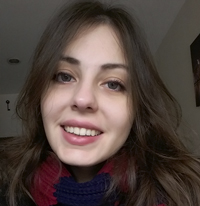
Gizem Senel
(Turkey)
I decided to apply to the master’s programme in Brain and Cognition because I was mainly interested in understanding the broader approach of cognitive neuroscience from an interdisciplinary perspective. I wanted to continue my studies in the field of neuroscience research, and UPF gave me an amazing opportunity not only to learn from the best minds in the field but also to do research alongside them.
I am a member of Ruben Moreno’s Theoretical and Cognitive Neuroscience group. The aim of my thesis is to understand the neural correlates and behavioural predictors of decision-making. I also presented a poster on ‘Artificial Networks and Integrated Information’ at the Human Brain Project’s conference on consciousness.
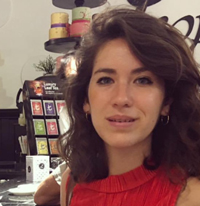
Alice Albertini Drew
(France)
After becoming interested in the philosophy of mind, consciousness and perception, I decided to pursue further studies in cognitive neuroscience. Given my interest in ‘applied’ neuroscience and the intersection between neuroscience, arts, technology and philosophy, I was also drawn to the interdisciplinary aspect of the CBC, which spans many of the core areas of research in neuroscience and offers a strong theoretical and practical foundation.
I carried out research for my MSc thesis in the Multisensory Research Group under the supervision of Salvador Soto-Faraco. We looked at a visual phenomenon called binocular rivalry, which has fascinated scholars of perception for years. We investigated the neural oscillations (brainwaves) involved in it by recording neural data with electroencephalography (EEG).

Maria Roser Cañigueral
(Spain)
I applied to the MSc in Brain & Cognition at the CBC (UPF, 2015), where I had the opportunity to work with Prof. Nuria Sebastian-Galles on a project looking at the effects of social rank on language learning. Then I moved to London to complete an MRes in Cognitive Neuroscience (Institute of Cognitive Neuroscience, University College London, 2016). During the MRes project, supervised by Prof. Antonia Hamilton, I investigated the relationship between perceptual mentalizing and social motivation in autism.
For my PhD I am investigating the cognitive and neural mechanisms that underlie eye gaze processing during live social interactions, both in neurotypical and autistic individuals. To study this, I combine behavioural tasks with eye-tracking and functional near-infrared spectroscopy (fNIRS).
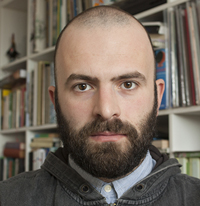
Pedro Tiago Martins
(Portugal)
Before enrolling on the MSc programme in Brain and Cognition, I earned a BA in Language Sciences from the University of Porto and an MA in Cognitive Science and Language from the University of Barcelona.
I am now in the later stages of a PhD in Cognitive Science and Language at the University of Barcelona, as part of the Cognitive Biology of Language Group. I am studying the evolution of vocal learning across species and its role in the emergence of human language.
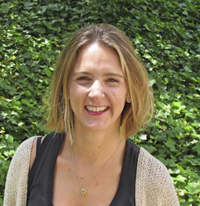
Josefina Cruzat
(Xile)
I joined the Theoretical and Computational Neuroscience group at Pompeu Fabra University as a PhD student. In my ongoing PhD project, I am currently exploring global network dynamics in the human brain. Specifically, I am exploring integration, segregation and some other intracortical EEG signatures, during rest and multiple cognitive tasks. To do this, I am measuring intracortical responses using stereotactic electrodes implanted within the brain in epileptic patients.
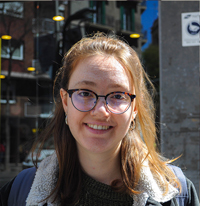
Carlota Pagès
(Spain)
After years of studying separate disciplines, I realized that the best way to combine them was to study the brain. I enrolled on the master’s programme in Brain and Cognition with the aim of studying music through science.
I am currently on my second year of a PhD in Language and Comparative Cognition. I am studying how experience such as musical training can change how we perceive and process music. To that end, I am comparing the neural responses of musicians and non-musicians. More specifically, I am focusing on the event-related potentials of unexpected musical events that violate musical context either syntactically or harmonically.
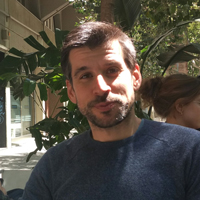
Marc Gimeno
(Spain)
I enrolled on the master’s programme in Brain and Cognition because I wanted a master’s degree that would offer me the opportunity to learn about language topics in relation to the brain, whilst at the same time allowing me to participate in all steps of the scientific research process.
I became a bimodal bilingual thanks to Catalan Sign Language and today I work teaching deaf children at a public school in Barcelona. My research explores the process of sign-language learning and the cross-linguistic interactions between spoken and sign languages, combining electrophysiological and behavioural measurements. The main objective is to improve the teaching practice of the deaf children.
